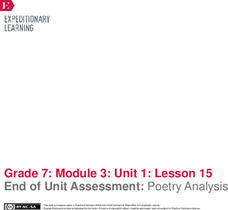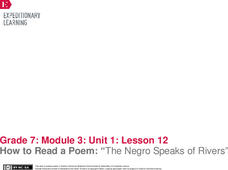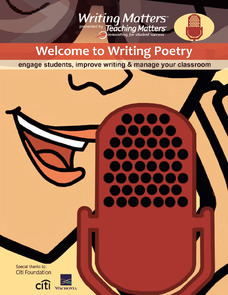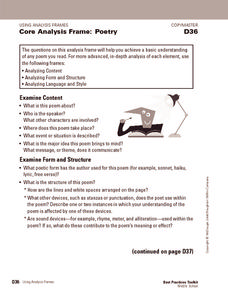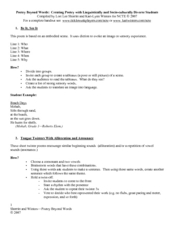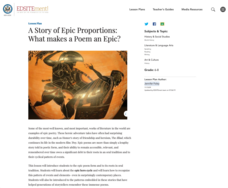Trinity University
The Shakespearean Sonnet
Looking for a great lesson to teach your class everything they need to know about Shakespearean sonnets? Here's such a lesson. "Sonnet #18" launches a study of the Shakespearean sonnet. Scholars watch two Prezi presentations that provide...
Trinity University
Introduction to Poetry
Introduce fourth graders to poetry with a three-week unit that has them examine the structural elements of poetry, analyze poems, and craft their own original poems rich in sensory details and other poetic devices. Young scholars study...
Teaching Tolerance
Poetry and Storytelling Café
Academics take turns as actors in an engaging poetry cafe. Elementary learners work in small groups to create original poems or stories addressing community issues and read their work in front of a live audience. Scholars also reflect...
EngageNY
End of Unit Assessment: Poetry Analysis
Learners finish the end-of-unit assessment by completing a poetry analysis of We Wear the
Mask. Scholars may use their Poet’s Toolbox reference sheets and How to Read a Poem anchor
charts to guide them through the assessment.
EngageNY
How to Read a Poem: “The Negro Speaks of Rivers”
Learners listen as a teacher models how to read a poem using The Negro Speaks of
Rivers. They use the How to Read a Poem anchor chart to help guide their thought process on how a poem requires different reading than other text. While...
Poetry4kids
How to Write a Funny Epitaph Poem
What can happen if you eat too much cafeteria food? Or wear dirty clothes every day? Or talk back to your mother? Use a lesson on humorous poems as a way for students to practice silly rhymes as fictional epitaphs.
Poetry4kids
How to Write a “Backward” Poem
If you like poetry, wait till you try backward poetry! Young writers read Shel Silverstein's "Backward Bill" before writing their own funny poems that are full of backward imagery and phrasing.
Poetry4kids
How to Write a Tanka Poem
Take your haikus to the next level with tanka poems, another form of Japanese poetry that regulates the length and rhythm of each line by syllables. Young writers read the explanation, examples, and tips for tanka poems before writing...
Poetry4kids
How to Write a Concrete or “Shape” Poem
Writers compose an original shape poem. Scholars choose a subject to write about and create a visual representation by forming a corresponding picture using the poem's words.
Poetry4kids
How to Start a Poetry Journal
Practice makes proficient! Using a journal of their choice, authors organize pages, then begin their writing journey of on-going writing practice in which they compose all poetic forms including diamante, limerick, free verse, and more!
College of the Canyons
Free Verse
Free verse poetry is often regarded as poetry without structure, but in reality, it is a poetic form that adheres to its own poet's thought and breath patterns. Delve into the rules and famous examples of free-verse poetry with a short...
Teaching Matters
Welcome to Writing Poetry
Your pupils are poets, and now they'll be able to show it with the exercises in this packet. The lessons, designed for beginner, intermediate, and experienced poets, not only feature a variety of poetic forms, but take learners through...
Geography 360°
Poetry Writing
Put the tips and tricks in this guide into practice in order to encourage your pupils to blossom into poets. A wonderful reference material for teachers, this packet includes definitions of poetic terms and forms as well as step-by-step...
Houghton Mifflin Harcourt
Core Analysis Frame: Poetry
Dig deep into any piece of poetry with a set of analysis questions. Ponder the content, form, and language of poetry and provide some question for critique. The first two pages include general questions, and the remainder of the document...
Curated OER
Poetry Notes
Break this presentation into two or three days so as not to overwhelm your kids. Fifty-four slides is a lot of slides, but the PowerShow is well-organized, and terms are defined clearly and illustrated in examples provided. A general...
National Endowment for the Humanities
The World of Haiku
Young scholars complete a study of Japanese culture through haiku. They read and interpret haiku poetry and write haiku of their own.
Curated OER
10th Grade Poetry Unit
Immerse your students into the wide world of poetry with this presentation, which opens a poetry unit. By first introducing the art of poetry and then providing examples of poems with figurative language, the presentation guides students...
Curated OER
7th Grade Poetry Project
Ask your pupils to explore the sounds, forms, and language of poetry by putting together a portfolio of their own work. In a binder, learners collect the poems listed on the second page of the assignment sheet. Each individual creates a...
Curated OER
A History of Poetry
What has rules and has no rules? What has rhythm and rhyme, and no rhythm or rhyme? What is arranged carefully and is scattered? Why, poetry, of course. Although text-heavy, this PowerPoint does provide a context for the study of poetry...
Curated OER
Poetry Beyond Words: Creating Poetry with Linguistically Diverse Students
Models of and directions for how to write 20 different types of poems are featured in an NCTE resource. The introduction to each form highlights the embedded concepts. For example, tongue twisters encourage poets to use alliteration and...
Curated OER
Bio-Poems and U.S. History
Students explore U.S. History by writing poems. In this United States leader biography lesson, students identify elements needed to create a good poem, and write a Bio-Poem about themselves. Students utilize the same form to write a...
Curated OER
Poetic Form
Learners read Red Boots On and explore prepositions. In this poetic form lesson plan, students analyze the use of prepositions in the poem. Learners might also explore the rhymes or objects. Students write original poems using...
National Endowment for the Humanities
A Story of Epic Proportions: What Makes a Poem an Epic?
Learners analyze the epic poem form and its roots in oral tradition. In this epic poetry lesson, students research the epic hero cycle and recognize the pattern of events and elements. Learners analyze the patterns embedded in the stories.
National Endowment for the Humanities
Robert Frost's "Mending Wall": A Marriage of Poetic Form and Content
High schoolers examine the relationship between a poem's form and its content in Robert Frost's poem, 'Mending Wall.' They read and analyze the poem, explore websites, listen to an audio clip of Frost reading the poem, and write an...





